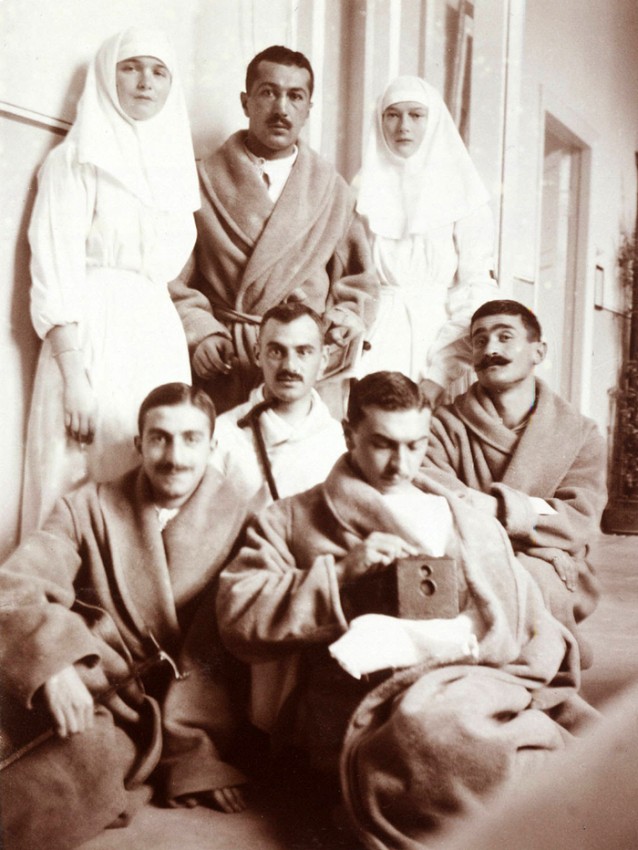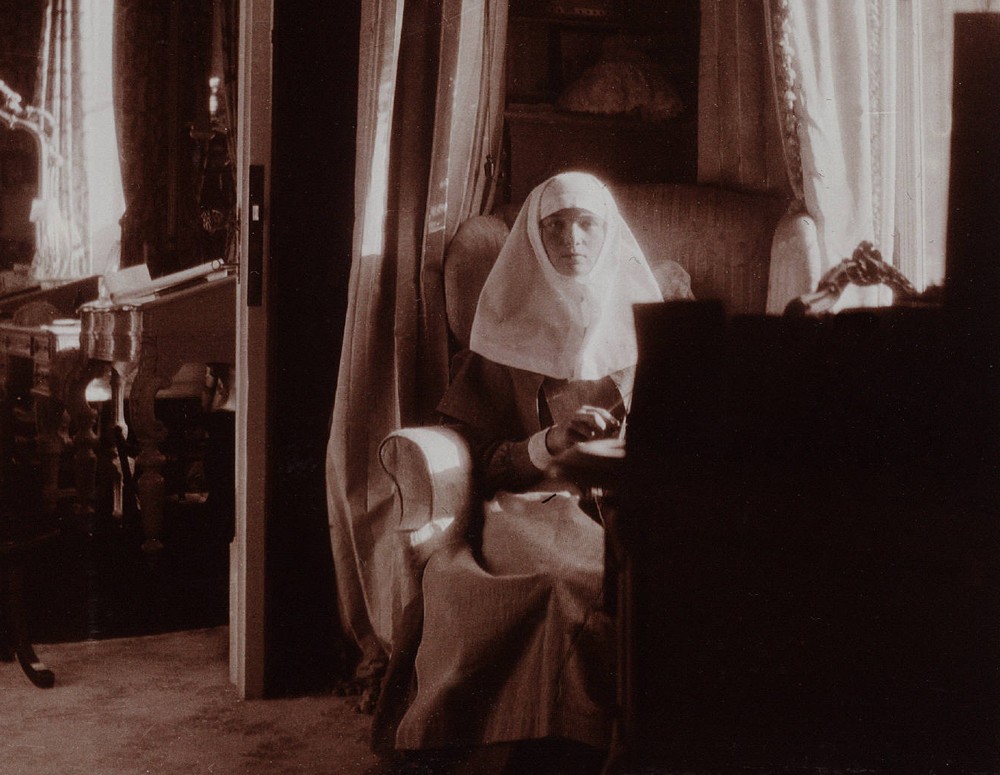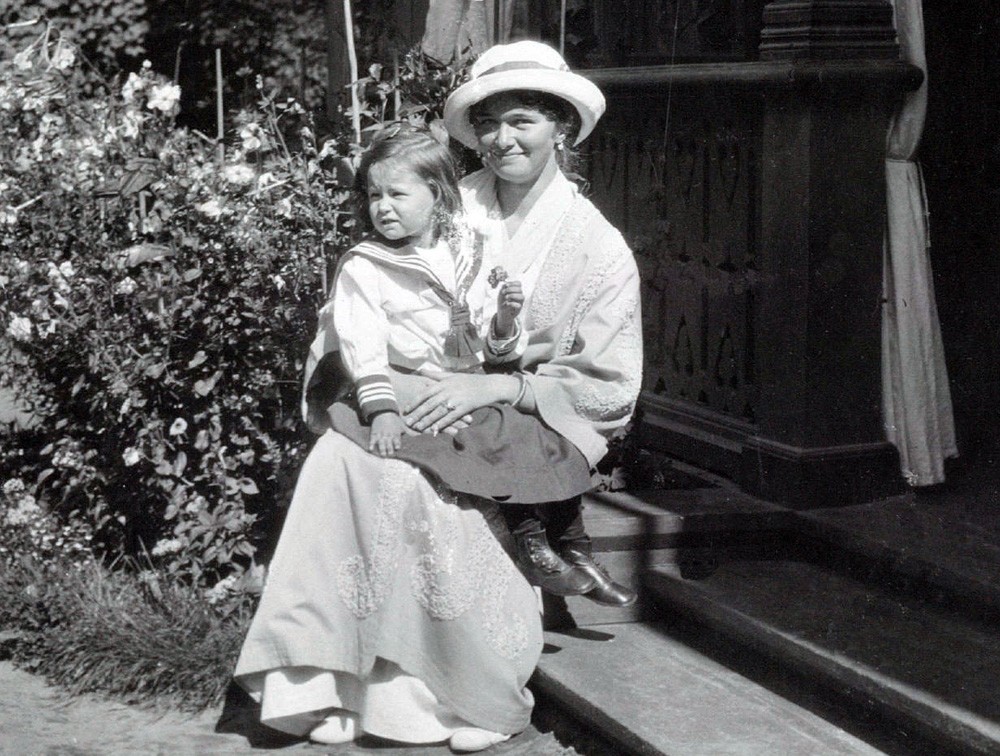Olga Nikolaevna — Grand Duchess, the eldest daughter of Emperor Nicholas II and Empress Alexandra Feodorovna was born on November 15, 1895 in the Alexander Palace.
«… Her unusually beautiful and gentle hands work skillfully and fast. She is all fragile and tender, bent with particular carefulness and love over a soldier’s shirt she sews … Her sweet voice, her graceful movements, her whole charming willowy figure is the embodiment of femininity and affability. She is all light and joyful. I can not help recalling the words told to me by one of her tutors: «Olga Nikolaevna has a crystal soul” …»
Olga was born on November 3, 1895. She became the first child in the family of the 27-year-old king.
«A day I will remember forever», Nicholas II wrote in his diary, «during which I suffered a lot! As early as one o’clock in the morning lovely Alix began to have pain that prevented her from sleeping. All day she lay in bed in severe anguish, poor! I could not look at her indifferently. At about 2, dear Maman came from Gatchina; the three of us, me, her and Ella, were constantly with Alix. At exactly 9 o’clock a baby’s cry was heard and we all breathed a sigh of relief! With a prayer we named the daughter sent to us by God ‘Olga’! When all troubles and horrors were over, there came a blissful consciousness of what had happened! Thank God, Alix went through the childbirth well and felt cheerful in the evening. I ate late with Maman and when I went to bed, I fell asleep at once!

The next day the emperor again confides to paper the feelings overflowing him: «Today I was present at bathing of our daughter. She is a big kid, weighing 10 pounds and 55 centimeters tall. I almost can not believe that this is our child. God, what a happiness! Alix was lying all day … she felt good and the little darling too. «
6th of November. Monday. «In the morning I beheld our lovely daughter; she does not seem to be a newborn at all, because she is such a big child with a head covered with hair.”
From the Diaries of Nicholas II.
Time has shown that the name chosen for the girl was proper. The eldest of the royal daughters was beautiful, moreover, she was a real Russian beauty and intelligent, and as to the strength of the character, she never lacked it. Olga inherited from her mother wonderful blond hair with a golden hue, large blue eyes and wonderful complexion. Over the years, Olga became more and more attractive. «She was a sweet creature. Anyone who saw her, fell in love immediately, “recalled Lily Den. “In her childhood she was ugly, but at the age of 15 she somehow grew prettier at once. A little above average height, fresh face, dark blue eyes, lush blond hair, beautiful hands and feet …

And here is another description of her appearance from one of her attendants: «Grand Duchess Olga was of average height, a slender girl, proportionally built and incredibly feminine. All her movements were filled with softness and elusive grace. And her glance, quick and timid, and her transient smile either thoughtful or absent-minded, produced an enchanting impression. Especially the eyes. Very big, blue like Ural turquoise, burning with a soft, radiant shine and attracting. «
From to her mother, she got a royal bearing and grace, from her father – a purely Russian appearance. She looked more like her father. «Olga Nikolaevna smiled as good as Emperor,» recalled the head of the Imperial Palace Guard A.I . Spiridovich. Everyone said that Olga took after the Romanovs. Nicholas II doted on the child, and Olga worshiped him from a young age. She was called «the daughter of her Father». «Their relationship with Emperor was lovely,» P. Gilliard recalls. For his daughter, Emperor was the tsar, the father and the companion; this feeling «passed from religious worship to complete credulity and the most cordial friendship.»

Downrightness, honesty and innate sense of justice were the hallmarks of Olga Nikolaevna. They said that by nature she was more like her mother than the others. The Empress always remained sincere and straightforward in her actions and motivations. «I will never forget,» recalled A. Taneeva, «her playing with sister Tatyana, cousins and children of Grand Duke Michael at the age of seven. One boy allowed himself a deliberately wrong move. Olga burst into tears and ran up to me with the words: «Do you know what he did, Anya? He told me lies. «
It happened that Olga was stubborn and told what she thought, sometimes even blunt. She could be quick-tempered. But everyone noted that with age, it smoothed out and Olga became softer, more affectionate, sensitive, preserving honesty inherent in her in the early days.

From the very childhood, important moral norms were instilled in Olga Nikolaevna, as evidenced by the letter of Empress Alexandra Feodorovna to her thirteen-year-old daughter dated January 1, 1909: «My dear little Olga! May the New Year 1909 bring you much happiness and blessings. Try to be exemplary — a good and obedient girl. You are the eldest and should be an example to others. Learn to please others, think about yourself in the last turn. Be affectionate and kind and never be harsh or rude. Talk and act like a real lady. Be patient and polite, try to help sisters in everything. If you see that someone is sad, try to comfort him and show your clear, radiant smile. You are so good at being kind and sweet to me, be the same with your sisters. Show your loving heart.
Above all, learn to love God with all the strength of your soul and He will always be with you. Pray to Him with all your heart. Remember, He sees and hears everything. He loves his children tenderly, but they must heed His will.

So, the words of Alexandra Feodorovna turned out to be prophetic, the eldest of the sisters left unforgettable memories in people’s minds … «She impressed the people around her with affection, charming and nice treatment of everyone. She always behaved calmly, strikingly straightforwardly and naturally, «said General M.K. Dieterichs.
Olga had great abilities, and she was called the most gifted of the royal children, she had a philosophical mind, her considerations were very deep. «She could play the most difficult musical pieces by ear, her voice was not strong, but pure,» wrote an Empress’s friend. «All the tutors were amazed at her memory, which, of course, she inherited from her father. Nothing could distract her if she from classes, she could read a text only once or twice, to know it by heart.

Olga Nikolaevna was remarkably smart and capable, and studies were like a game for her, that’s why she was lazy sometimes, recalled A. Taneeva.
She was religious. She took her faith mainly from her mother. Grand Duchess liked to visit the Church of the Sign of the Mother of God in Kuzminskaya Street in Tsarskoe Selo. As late as the days of imprisonment, Olga sadly admitted in one of her letters: «Today it’s quite still, one can hear a ringing in Catherine’s Cathedral; sometimes I want to go to the Sign so much… «
Her faith was deep, and they said that she was inclinable to mysticism. Having become older, Olga got to like solitude, she wrote poems, often sat for a long time reading. Her favorite writers were Chekhov, Turgenev and Leskov. She kept a diary and carried on much correspondence.
In her free time, Grand Duchess went horse riding, could shoot at a target with her brother, played the piano and sang sometimes. The closest of her friends was Margarita Khitrovo. There was nothing special in such life, but many people noticed some unusual seriousness in Olga… She was incredibly attentive to people and sensitive to someone
else’s troubles. «I will never forget a subtle, completely inartificial, but sensitive approach to my grief …» — wrote E.S. Botkin about the eldest Grand Duchess

Grand Duchess Olga Nikolaevna was adored and worshiped; mostly the wounded liked to tell me about her, «- wrote S. Ofrosimova.
There is a vivid example of how the wounded loved her and how she helped them as best she could from the memories of a soldier.
«Grand Duchess Olga was delicate, shy and affectionate in her manner. She was embodied kindness by her nature. I remember once it was hard and disgusting: bandages were my nightmare. The mere thought of being taken to a bandage in 20 minutes made me go hot and cold: I had to endure terrible pain. That day I was waiting for a bandage.
Duchess Olga came. She looked at my frustrated face and asked smiling:
— What’s wrong with you? Is it hard for you?
I told her frankly what was wrong.
The Grand Duchess smiled once again and said:
— I’ll be right there.
And indeed, from that time on I had morphine injected not 3-4 minutes before the bandage, as it had been done before and had delayed effect, but in advance — 10 minutes before.

Another time Grand Duchess personally wrote a letter for lieutenant Sergeev to be sent to his family home, since his right arm was amputated. In general, amazing things were told about the kindness of Duchess Olga in the infirmary… «
The same officer S.P. Pavlov wrote: «In the infirmary, concerts were also held often… Grand Duchess Olga Nikolaevna usually played music, she had a wonderful ear for music. For example, she easily picked music to a completely unfamiliar melody. Her playing was fine and noble and touch — gentle and smooth. I still remember one waltz, an ancient grandfather’s waltz — soft, graceful and delicate, like an expensive porcelain toy — the favorite waltz of Grand Duchess Olga. We often asked the Grand Duchess Olga to play this waltz for us, and for some reason it always made me very sad. «
Olga got up early in the morning, though she went to bed at 2 am sometimes. For days, she did not take off the suit of sister of mercy. When sanitary trains arrived, Olga, along with her mother Empress and her sister made bandages, often to complete exhaustion. Olga could hardly bear the sight of open wounds, but, forcing herself, she was attentive and accurate. She made bandages to the wounded with such kindness and care that soldiers and officers with tears thanked God who sent them an angel in flesh.

Strong sensitivity to other people’s grief made the work of sister of mercy incredibly hard for Olga. Anna Taneeva recalled that after two months of work in the hospital, Olga was barely able to stand on her feet. Only strong will and faith helped her not to fall under the weight of the cross put on her.
Let’s go on with the memories of Grand Duchess, retold by our familiar S. Ofrosimova during the charity fairs in the Catherine Palace: «Grand Duchess Olga Nikolaevna is sitting across from me … I am attracted to her by an irresistible power — the power of her charm. I almost can not work when she sits so close to me, and I look at her enchanting face. Only then I lower my eyes back to work being confused when I see her clever, kind and gentle eyes, I am embarrassed and lost when she talks to me cheerfully…
In a strict sense, she could not be called beautiful, but her whole being is imbued with such femininity, such youth that she seems more than beautiful. The more you look at her, the more beautiful and charming her face becomes. It is illuminated by the inner light, it becomes pretty from every light smile, from her manner of laughing, head thrown back, so that you can see the whole even pearly row of snow-white teeth.

«… Her unusually beautiful and gentle hands work skillfully and fast. She is all fragile and tender, bent with particular carefulness and love over a soldier’s shirt she sews … Her sweet voice, her graceful movements, her whole charming willowy figure is the embodiment of femininity and affability. She is all light and joyful. I can not help recalling the words told to me by one of her tutors: «Olga Nikolaevna has a crystal soul” …»

The arrest of the Imperial Family in March 1917 and subsequent revolutionary events had a strong impact on Olga Nikolaevna. «The horror of the revolution influenced her much more than others,» noted Sophie Buxhoeveden. «She changed completely, her cheerfulness disappeared.»
From the memoirs of M.K. Diterikhs: «Grand Duchess Olga Nikolaevna gave to the people who studied her nature the impression of a person who seemed to have experienced some great grief in life. Sometimes she laughed, but it felt like her laughter was mere display, but there, in her heart, she was not joyful at all, but sad. » «She was a born thinker, and as it turned out later, she understood the whole situation better than any of her family members, including even her parents,» believed Gleb Botkin, the son of physician Eugene Botkin deceased together with the Imperial Family. «Finally, I had the feeling that she had no illusions about what the future held for them, and as a consequence, she was often sad and anxious.»
After the arrest, Olga Nikolaevna’s health declined considerably, she was often ill and was the first of the sisters who contracted measles; the disease was severe, it developed into typhus with a fever of 40.5°.
«Olga Nikolaevna has changed a lot,» Sophie Buxhoeveden wrote. — Anxiety caused by the absence of parents and responsibility that fell on her, when she was left the head of the house to take care of her ill brother, made a change in a gentle, beautiful twenty-two year old girl, turning her into a withered and sad middle-aged woman. She was the only Tsarevna who was keenly aware of the danger her parents were in.

Having moved to Ipatiev House, Grand Duchess Olga, from the most talkative, very charming and cheerful girl turned into her own shadow, she kept aloof and sad. The guards recalled that «she was thin, pale and looked sick. She rarely went for walks in the garden and spent most of the time with her brother. «According to Netrebin, one of the guards who was right at the central post at the entrance to the prisoners’ premises during the last days from 4 to 16 July, «the former duchesses stayed cheerful, talked sometimes… The older one was disgustingly thin, all skin and bones. She behaved like a mother … «
Yet, despite all the bitterness of the situation, faith and love to all people cultivated in Great Princess Olga made her forgive offenses, villainies and mockeries in the hard days of imprisonment, bred in her young heart humility and meek prayer for the enemies. A poem by Sergei Bekhteev copied by Olga Nikolaevna was later found in Ipatiev House:
Lord, give us patience
In violent, gloomy days,
To stand people’s outrage
And tortures of our executioners.
Give us strength, Oh Good God,
To forgive the villainy
And to bear the heavy and bloody cross
With Your meekness.
And in the rebellious days,
Help us, Christ the Savior,
To endure shame and insults,
When the enemies rob us.
Lord of the world, God of the universe,
Bless us with a prayer
And give rest to the humble soul
In the unbearable, terrible time.
And at the threshold of grave
Give to Your slaves
Unhuman forces
To pray humbly for the enemies.


